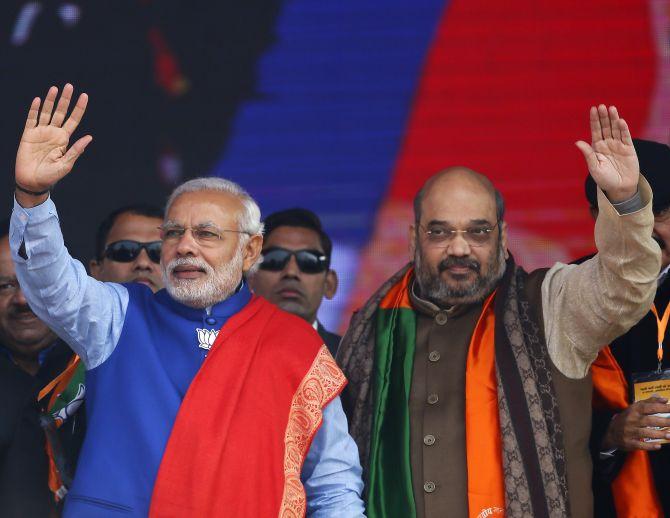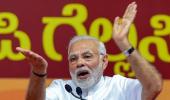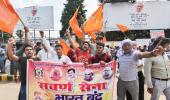This whirlwind of activity only confirms that rushing around creating an impression of pompous busy-ness is not the same thing as solving problems, argues Mitali Saran.

Well, 2019 has certainly hit the deck running.
From the Department of Big Moves this January: After passing the Aadhaar Act in 2016 as a Money Bill -- despite all the evidence presented for why it does not solve problems it was created to solve, and does create others including the documented starvation and death of some citizens -- the Lok Sabha pushed through the Aadhaar Amendments Bill, which sneaks private players back into the game.
Asia Times reported that based on an audio recording of a meeting between iSpirit and Khosla Labs, it seems that private players who seek to build tech businesses off the Aadhaar database knew about the Aadhaar Amendments Bill before members of Parliament did.
The for-profit, for-power collusion between the government and private players, is the engine that powers Aadhaar as it is today.
The Aadhaar Amendments Bill gives private parties unregulated access to voluntarily given Aadhaar data, since the government has not first framed a data protection bill, as it should have.
Everyone knows that Alok Verma, chief of the Central Bureau of Investigation, was 'sent on leave' by the government last October; but if you blinked this January, you missed his reinstatement by the Supreme Court, followed -- blink -- by his sacking and transfer to the General Fire Service, Civil Defence, and Home Guards, which he -- blink -- refused.
The independence of the so-called 'caged parrot' has been a joke for too long.
But then court verdicts -- on Aadhaar, on Sabarimala, and on the CBI -- are now flouted or sidestepped or misdirected (as in the case of the government's Rafale submission) so often that they are being made to look increasingly like valuable suggestions that the government can choose to consider or not.
While politicians and big businesses hug over gigantic defence contracts and data technology, the Centre for Monitoring Indian Economy reports 11 million jobs lost in 2018, with the most vulnerable populations taking the hardest hit.
Business Standard noted that the Labour Bureau's report for 2016-2017 -- showing a four-year high in unemployment even excluding the effects of demonetisation -- is not being made public.
In the last five years, more jobs have been lost than gained, and women are plummeting out of the workforce.
Farmers and workers have marched in protest repeatedly over the last five years, and last fortnight India saw the largest strike in its history, with a huge number of workers participating in a two-day bandh called by 10 trade unions against the government's 'anti-labour' policies.
These terrifyingly huge problems will be temporarily outshouted, but not solved, by Sangh-fostered communalism, or spats about which political party is more insulting to women (they all are, welcome to Patriarchy 101).
Governments are not necessarily terrified by the idea of people suffering, but they are terrified by the idea that suffering people might not vote for them, so the BJP's panicky response has been to pass the 124th Constitution Amendment Bill.
It reserves 10 per cent of government jobs for an 'economically weak' section of society defined so daftly that it would apply to large numbers of journalists in Delhi.
More importantly, the Bill flies in the face of court judgments (what's new) stating that quotas cannot be economically based.
Besides being a transparently election-driven ploy that some have called a 'poverty alleviation scheme', the Bill creates messy new problems of scope, and properly buggers up the caste-disempowerment rationale of having reservations in the first place.
How is it that almost all parties have backed this move?
The last, though not least, big move this January is the Citizenship (Amendment) Bill 2018, which seeks to relax the terms of the Assam Accord by which people from neighbouring countries can become Indian citizens.
A large number of people left out by the National Register of Citizens, therefore, will now qualify for Indian citizenship -- with the exception of Muslims.
In one fell swoop, therefore, the BJP has managed to both anger the north east, and violate the Constitutional principle of religious non-discrimination.
This whirlwind of activity only confirms that rushing around creating an impression of pompous busy-ness is not the same thing as solving problems.
It's as if we'd hired the BJP to fix up our one and only house, but all it has done is rip out all the load-bearing walls and re-arranged the flower vases, while spending a lot of our budget on loud advertising about how it hasn't taken a single day off from the job.
On January 11, The Telegraph asked, in a very large headline, 'Are we donkeys?' The answer should roll in by May.











